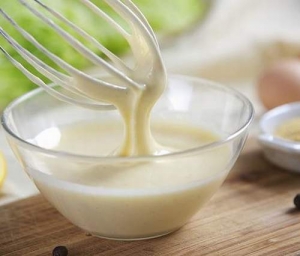In recipes, often, it is not recommended to use only extra virgin olive oil for the mayonnaise. The use of olive oils significantly affected both droplet size and distribution. The changes in the properties could be related to the content of polyphenols of the oils
Mayonnaise is one of the most famous sauces in the world. As with all products or preparations known more and more nations vie for authorship of creation.
In the case of mayonnaise, some say that is derived from the Spanish city of Mahon, where the cook's military Armand de la Porte, Duc de Richelieu, improvised, in 1757, a sauce made of olive oil and egg yolk. The French, however, abut the mayonnaise on the basis of an ancient French word Moyeau (pronounced Muaiò) which means egg yolk.
In the homemade recipes for making mayonnaise is often recommended to use a vegetable oil or a maximum of one extra virgin very delicate. Generally this indication vine justified only by a matter of taste, an extra virgin olive particularly fruity, bitter and pungent in flavor prevails, spoiling the overall balance.
But is this the only reason?
Carla Di Mattia, University of Teramo, studied the physical and structural properties of mayonnaises made with extra virgin olive oils (EVOO).
To this aim, different EVOOs were selected according to their phenolic content along with other vegetable oils, peanut and sunflower, taken as reference. Mayonnaises were characterized by droplet size distribution, microstructure, textural, rheological and sensory properties.
The droplet size distribution and microstructural properties of the mayonnaises resulted significantly affected by the type of oil used. Samples produced with EVOO showed lower dispersion level, a more coarse and irregular structure and the lowest consistency and firmness when compared to sunflower or peanut oils. The elastic and viscous modulus G′ and G″, evaluated by rheological measurements, resulted inversely related to the content of polyphenolic compounds.
Bibliografy
Carla Di Mattia, Federica Balestra, Giampiero Sacchetti, Lilia Neri, Dino Mastrocola, Paola Pittia, Physical and structural properties of extra-virgin olive oil based mayonnaise, LWT - Food Science and Technology, Available online 16 October 2014, ISSN 0023-6438
Source: http://www.teatronaturale.com/


